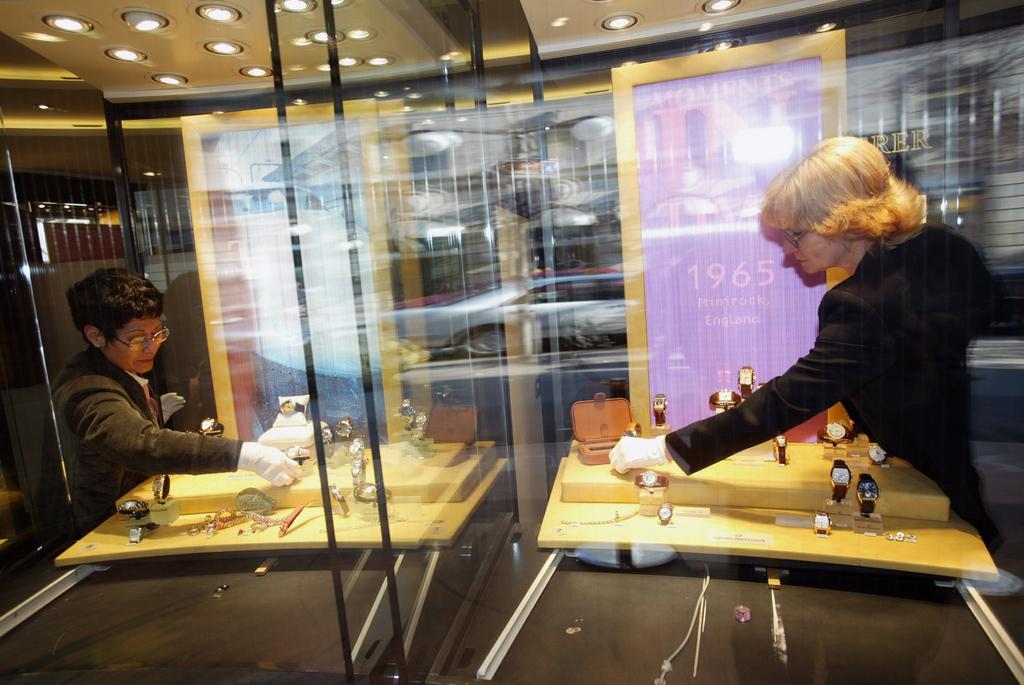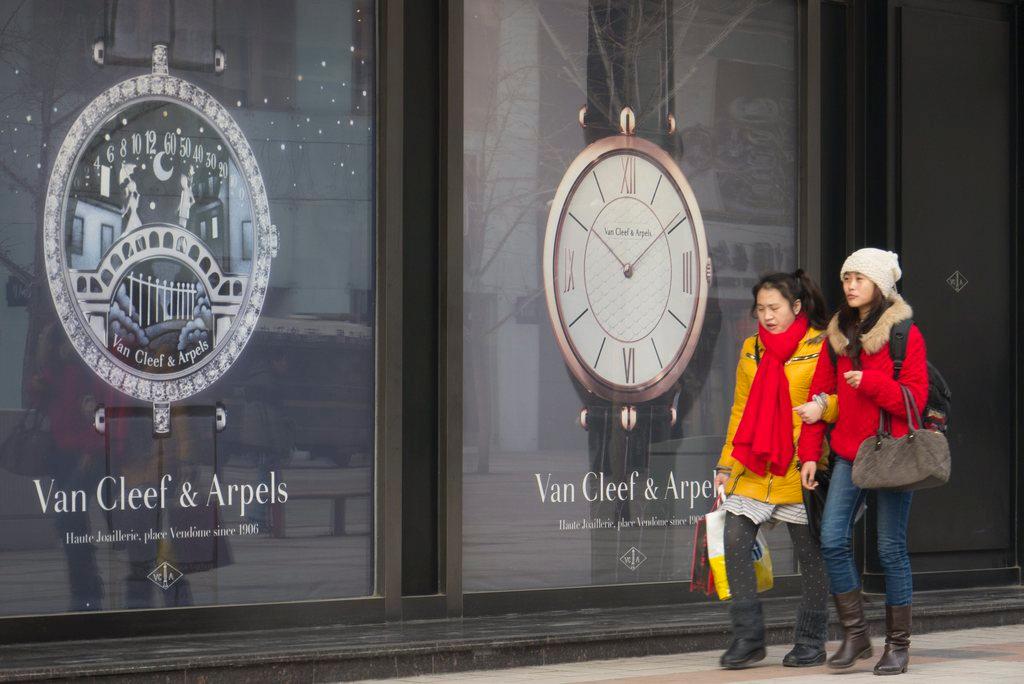Swiss watchmakers start to feel the pinch
After years of unbridled growth, the Swiss watchmaking industry is experiencing a slowdown not seen since the 2009 economic crisis. In recent weeks, more firms in the Jura region, the cradle of Swiss watchmaking, have announced job cuts. And there is no sign of a recovery in 2016.
In appearance, the Jura valleys exude calm, bathed for weeks in an exceptionally bright sun for the season. In front of the imposing factory buildings, which sprang up on the outskirts of the main watchmaking towns over the past decade – symbols of an unprecedented boom in the industry – the full-to-bursting car parks suggest that work is still in full swing.
However, inside the factories, the atmosphere is one of gloom, reflecting an impending crisis that many are still reticent to name outright. “Most of the watch brands owned by big groups have been able to avoid layoffs or recourse to partial unemployment, thanks to the booty accumulated in recent years. But the workshops are clearly functioning at reduced capacity,” says an industry insider, who wished to remain anonymous in a microcosm where discretion is a cardinal value.
The situation is different for independent brands and suppliers, the first casualties in an economic downturn, which can no longer hide their difficulties. Since the summer, dismissal announcements and partial unemployment have been on the rise. And this is without counting the “downsizing” of many temporary staff, who fall outside the radar of trade unions and official statistics.
Door closed and boss absent
In Les Brenets in canton Neuchâtel, a few hundred metres from the Doubs river that marks the border with France, Philippe Petit-Jean, director of the workshops of the same name, has just announced the dismissal of 60 of his 207 employees.
Contacted by phone, he agrees after some hesitation to meet us the next day in his offices, to talk about the difficulties facing his family-run business, which specializes in assembling mechanical watch movements. But he then lets us down. “He cannot receive you unfortunately, as he has had to go out this afternoon,” an employee tells us tersely, after keeping us waiting for a long time at the door.
“Philippe Petit-Jean is a good boss who cares about his staff. If he had to make such a drastic cut to his workforce, it means he really had no other option, so bleak is the outlook for 2016,” explains Francisco Pires, a watchmaking specialist at the Unia trade union in La Chaux-de-Fonds.
Stocks overflowing
As Pires points out, the downturn did not start yesterday. “We’ve seen a drop in orders for nearly a year, but the trend has accelerated over the past months.” Watch exports fell by 7.9% in September compared with the same period in 2014, a situation not seen since the 2009 economic crisis. And these figures do not reflect an even more worrying fact: according to several industry insiders, some brands have more than a year’s worth of stocks, and sometimes two, piling up in their warehouses.
A whole range of causes has been put forward to explain the current difficulties: the conflict in Ukraine, the fall of the rouble, the explosive situation in the Middle East, the anti-corruption campaign and decline in growth in China, the arrival of connected watches, or the strong appreciation of the Swiss franc since the beginning of the year. “The decision [by the Swiss National Bank] to scrap the minimum exchange rate of the euro against the franc on 15 January lost us a billion francs in turnover,” Nick Hayek, the leader of Swatch Group, the largest watchmaking group in the world, told the NZZ am Sonntag newspaper in early November.
Some observers believe, however, that Swiss watchmakers cannot just blame external shocks, but must also shoulder their share of the responsibility. “Spoiled by easy profits during years of unbridled growth that owed nothing to its merits, but rather an unexpected and mechanical increase in its share of the pie, the watchmaking industry has squandered the profits on mind-blowing marketing budgets, swanky factories and senseless investment in the fanciful verticalisation of production processes,” writes Gregory Pons, editor of the website business watches and jewellery.
Production overcapacity
“We cannot fault the companies for having invested broadly in the past years,” counters Romain Galeuchet, communications manager at the Employers’ Federation of the Swiss Watchmaking IndustryExternal link. “Many brands adapted their production facilities in response to the decision by Swatch Group no longer to deliver the components for mechanical watch movements to its competitors. But perhaps some watchmakers thought too big and adapted their production capacity too fast.”
However, Galeuchet prefers not to talk about a crisis as such, but rather a “serious setback.” Backed by supporting figures, he highlights the exceptional growth in the sector in recent years. Watchmaking today employs nearly 60,000 people, that is 10,000 more than four years ago. One would have to go back to the 1970s, before the Asian quartz crisis, to find comparable numbers.
For this year, the Employers’ Federation expects at best a stagnation in the number of jobs in watchmaking, and at worst a slight decrease, which should not exceed 5%. “In 2009, following the global financial crisis, 4,000 jobs were cut in watchmaking, that is 8 to 9% of the workforce,” says Galeuchet.
In his office in the town of Le Locle, which was awarded UNESCO world heritage status for its exceptional urban planning shaped by the watchmaking industry, the left-wing mayor Denis de la Reussille shares the industry’s concerns, while also refusing to paint too black a picture.
“There will be a slight drop in tax revenue with an impact on the town’s public finances. But this is not the worst crisis we have lived through. Also, the situation differs greatly from one company to the next; some firms in the subcontracting sector or those producing for niche markets are having a very hard time, while the region’s big names are relatively unscathed,” he notes.
Tissot, one of Swatch Group’s flagship brands, is still in radiant health, according to the mayor. Moreover, he adds, Le Locle today has a record 8,000 jobs for 10,500 inhabitants, many of them in watchmaking.
Nearly 40% of these jobs are filled by workers who live across the border in France. At Gilbert Petit-Jean, in the neighbouring commune of Les Brenets, as many as four employees out of five commute to Switzerland each day for work. “In the months ahead, the French border regions in particular are likely to see a significant rise in unemployment,” predicts the trade unionist Pires.
Neuchâtel, Switzerland’s leading watchmaking canton, which also has many subcontracting firms, is the hardest hit by the recent difficulties affecting the sector. In May, citing the Russian-Ukrainian crisis, Ulysse Nardin announced the dismissal of 26 of its 320 employees in La Chaux-de-Fonds and Le Locle. At the same time, Bulgari closed one of its two sites in La Chaux-de-Fonds, which employed 20 people.
In July, the Christophe Claret factory in Le Locle laid off 20 of its employees. In October, Parmigiani made 17 of its 100 staff redundant on its Fleurier site. The Gilbert Petit-Jean workshops in Les Brenets announced the impending dismissal of over one third of their 207 staff, while Prototec and La Joux-Perret in La Chaux-de-Fonds are laying off some 15 employees between them.
The trade unions are expecting further announcements of this kind before the end of the year. And the above list is not exhaustive. Other watchmaking regions of Switzerland are also affected by the phenomenon, although to a lesser degree so far.
Translated from French by Julia Bassam

In compliance with the JTI standards
More: SWI swissinfo.ch certified by the Journalism Trust Initiative





You can find an overview of ongoing debates with our journalists here. Please join us!
If you want to start a conversation about a topic raised in this article or want to report factual errors, email us at english@swissinfo.ch.